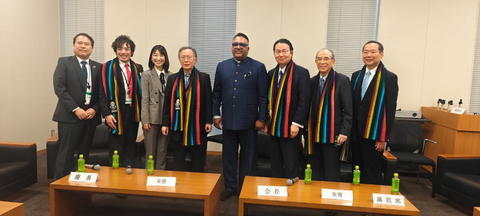O.P. Jindal Global University?s Vice Chancellor, Prof. C. Raj Kumar Addresses the Japanese Parliament
26.04.2024 - 07:07:36At the invitation of the Japanese Parliamentary Committee of the World Federation, the founding Vice Chancellor of O.P. Jindal Global University, Professor (Dr.) C Raj Kumar addressed a caucus of over 20 distinguished Members of the Japanese Parliament (National Diet), which also included the Hon’ble Minister of Education, Culture, Sports, Science and Technology, Government of Japan, Mr. Masahito Moriyama. Prof. Raj Kumar is also the first Indian Vice Chancellor to be invited to speak at the Japanese Parliament, addressing distinguished MPs and public officials of the Government of Japan.
This press release features multimedia. View the full release here: https://www.businesswire.com/news/home/20240425207420/en/

Professor (Dr) C. Raj Kumar, Founding VC, O.P. Jindal Global University, India at the Japanese National Parliament in Tokyo, Japan on 23 April 2024. (Photo: Business Wire)
During the visit, several Memorandums of Understanding (MoUs) were formalized, marking significant milestones in fostering academic cooperation between JGU and leading Japanese universities which include: University of Yamanashi, Yamanashi Gakuin University, ?Ryukoku University, ?Kwansei Gakuin University’ ?Kansai Gaidai University, ?Ritsumeikan University, and ?Hiroshima University.
The Japanese Parliamentary Committee of the World Federation invited Prof. Kumar to share his views relating to India’s national education policy, bilateral relations, development agenda and global governance. The committee included Mr. Mitsuo Ohashi, Chairman, Japanese Parliamentary Committee of the World Federation, Professor Masakuni Tanimoto, Under Secretary General, Japanese Parliamentary Committee of the World Federation, Mr. Kiyoshi Odawara, State Minister of Foreign Affairs, Japan, H.E. Mr. Makoto Hayashi, Deputy Assistant Minister, Ministry of Foreign Affairs, Mr. Takahiro Kanamori, Representative, Friends of the United Nations, Asia-Pacific, Dr. Hirobumi Niki, Member of the House of Representatives, Liberal Democratic Party, Dr. Masahito Moriyama, Minister of Education, Culture, Sports, Science and Technology of Japan, Mr. Seishiro Eto, Member of the House of Representatives, Former Vice Speaker, House of Representatives, Ms. Motoko Mizuno, Member, House of Councillors, The Constitutional Democratic Party of Japan, Mr. Satoshi Asano, Member of the House of Representatives, Democratic Party for the People, Mr. Kenta Aoshima, Member of the House of Councillors, Ms. Ayaka Shiomura, Member of the House of Councillors, Mr. Makoto Hayashi, Deputy Assistant Minister & Ambassador, ASEAN, Asian and Oceanian Bureau and Southeast and Southwest Asian Affairs Department and Dr. Sukehiro Hasegawa, Chairman, Japan Advisory Committee on Global Governance.
Prof. Kumar delivered a speech on the Indo-Japan relationship as a cornerstone for collective progress and prosperity. “India and Japan have shared civilizational values and cultural heritage, including the profound influence of Buddhism as a religion and philosophy in our countries. This relationship is the most important and critical relationship in the Indo-Pacific region. Japan has a pivotal role in ensuring peace, stability, and sustainability in the region with long-term cooperation between India and Japan to address shared challenges towards peace, development and security in the Indo-Pacific region,” he said. Prof. Kumar recalled the outstanding courage of conviction and intellectual integrity of the distinguished Indian jurist, Hon’ble Mr. Justice Radha Binod Pal, former Judge of the International Military Tribunal for the Far East for his contribution to equity, justice and fairness in Tokyo Trials by ensuring that international criminal justice does not perpetuate the “Victor’s Justice” phenomenon.
Prof. Kumar emphasized the alignment of democratic principles, rule of law and respect for human rights, emphasizing the convergence of enlightened national interests and democratic values between the two nations and underscored India's demographic dividend manifested through a billion people who are less than 35 years of age, with a burgeoning youth population poised to collaborate with their Japanese counterparts for mutual growth and development.
The speech generated lively interest and discussion among the Japanese MPs. In response to their questions and perspectives, Prof. Kumar expounded on India and Japan's joint endeavours within the United Nations, advocating for their permanent representation in the Security Council and the reform of the UN. Further, he reiterated India's steadfast commitment to higher education, emphasizing the principles of excellence, equity, and inclusion as outlined in India’s National Education Policy 2020. Prof. Kumar also highlighted that these principles find manifestation through our commitment to excellence, diversity and access by offering scholarships and institutional support to our students. Prof. Kumar observed that universities such as JGU and other reputed higher education institutions in India foster an environment conducive to promote research excellence and innovation among our faculty for institution building.
In conclusion, Prof. Kumar reiterated the transformative potential of Indo-Japanese relations that need to be built on the expansion of educational partnerships between universities in both the countries. He expressed optimism about the future trajectory of Indo-Japanese collaboration in higher education, envisioning a landscape defined by excellence in research and scholarship, and the creation of knowledge through leadership in promoting frugal innovation.
It is notable that the meeting, that was held at the Japanese National Parliament, Diet, was attended by Mr. Masahito Moriyama, Japanese Minister of Education, Culture, Sports, Science and Technology who also shared his reflections on the India-Japan relations.
View source version on businesswire.com: https://www.businesswire.com/news/home/20240425207420/en/





